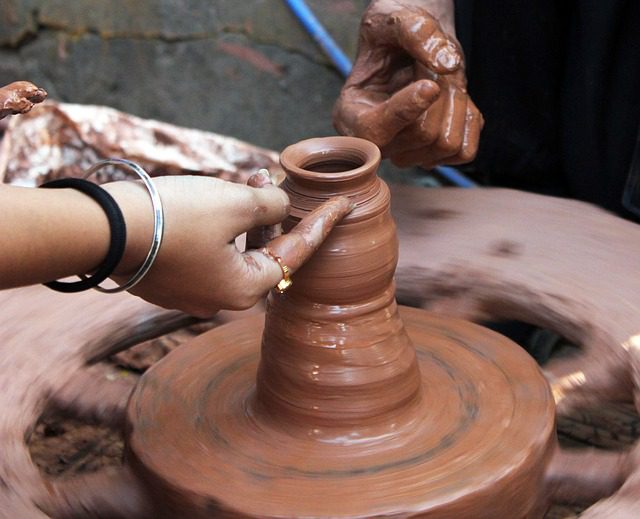Here’s another post in an occasional series about blue-collar work and meaning that we’re running here on MISSION:WORK, this one from a farmer and college administrator. Read the first two posts here: “Does blue-collar work have any meaning?” and “Which is a higher calling: building churches or building fences?”
By Stephen Milliken
In his excellent work, Shop Class as Soulcraft, Matthew Crawford reflects on the frustratingly hollow practice of “image maintenance” that seems to be par for the course within companies as well as institutions of learning today and contrasts this experience with the concrete satisfaction and sense of agency experienced through manual competence. He makes the claim, “Where no appeal to a carpenter’s level is possible, sensitivity training becomes necessary.”
 But at the core of the sense of agency and satisfaction that comes from manual competence is the freedom of creativity and self-governance found within the experience of the craftsman. And this sense of creativity and agency is lost within a mechanized system that reduces work to bits and pieces of an unexperienced whole. Even more powerfully, this loss of creativity and agency is found within both the arenas of manual competence and “knowledge worker” fields. The same sense of meaninglessness and powerlessness associated with the mundane work in an office cubicle characterizes a manual laborer asked to only do one specific task in a factory or on a job site.
But at the core of the sense of agency and satisfaction that comes from manual competence is the freedom of creativity and self-governance found within the experience of the craftsman. And this sense of creativity and agency is lost within a mechanized system that reduces work to bits and pieces of an unexperienced whole. Even more powerfully, this loss of creativity and agency is found within both the arenas of manual competence and “knowledge worker” fields. The same sense of meaninglessness and powerlessness associated with the mundane work in an office cubicle characterizes a manual laborer asked to only do one specific task in a factory or on a job site.
Though industrial values and paradigms can be incredibly useful at certain times and in certain degrees, the speed and scale of industrial influence with its commitment to efficiency, mechanization, and speed cause difficulty in slowing down, reflecting upon, and even stopping these deeply embedded cultural paradigms. But the values of the craftsman can help, in part, to heal this corporate-industrial wound.
What is a craftsman? Why is craftsmanship integral to culture? A craftsman is most fundamentally a creator and a lover, guided by a deep ethic of care for her craft, her product, and those for whom she creates. To refer to these only as buyers or consumers can, when craftsmanship is at its best, unjustly narrow the relationship to monetary exchange. Rather, the craftsman enters into relationship and partnership with others in order to provide a service that is desired and that will truly benefit others. To the relationship she brings an expertise regarding the materials that she uses, a skill in working with that material, and an artful creativity in form and function.
The craftsman desires to know about all of the qualities of her material. If the craftsman is a carpenter, she will know which sorts of wood will provide the right kind of color desired, which will do better in a moist environment, and which will prove useful for the task at hand. What’s more, because she cares for her material, she will care about all of the processes involved with her material, discovering and navigating new terrain regarding her craft.
The craftsman is not just a cog in a wheel, but is involved with building the wheel. The carpenter will know what is involved from tree to wood – from forestry to the milling process, drying process, and even the environment within which the product grew. By way of the ethic of care, the craftsman comes to learn how these processes and environments affect her material. There is a depth of knowledge and experience here that is incalculable, a depth that, in many fields, remains  unexplored and under-valued.
unexplored and under-valued.
Because of the ethic of care for her material, the craftsman acts as one kind of accountability for a complex system moving from organic material to cultural product. And in a culture driven by the bottom line and one that has established a system of opaque bureaucracy, transparency and accountability is incredibly important. As we continue to learn how connected and dependent we are upon that organic material, it will continue to become increasingly important that we pay attention to and care for how it is used and how that use affects us in turn.
Because reality is largely material, there is work not only in creating new things, but in repairing and tending to old things as well; not just in endless innovation but in restoration, in the redemption and stewardship of materials. As such, the environmental benefits of craftsmanship cannot be overstated.
To change the current situation we must not only understand the value and importance of this humanizing work of craftsmanship, but as consumers and investors we must be ready to financially support this endeavor. For in the public market the craftsman builds an intimate knowledge of her material, and her personal work and education merges with her contribution to the common good. If we are to promote good work, we must be in the business of promoting work and working environments oriented around the value system of the craftsman. Our sense of scale and efficiency must be on this human register.
 Crawford’s Shop Class also makes a case for the ability of materials to draw our rapt attention. He suggests that, “To respond to the world justly, you have to see it clearly.” Working with material things helps us to see clearer. We engage in problem-solving and look for the small inconsistencies that jump out at us when we pay attention. And paying attention opens us up to seeing things differently on a regular basis. Otherwise we couldn’t come up with ways to fix new problems that we encounter; this sort of paying attention cultivates ingenuity.
Crawford’s Shop Class also makes a case for the ability of materials to draw our rapt attention. He suggests that, “To respond to the world justly, you have to see it clearly.” Working with material things helps us to see clearer. We engage in problem-solving and look for the small inconsistencies that jump out at us when we pay attention. And paying attention opens us up to seeing things differently on a regular basis. Otherwise we couldn’t come up with ways to fix new problems that we encounter; this sort of paying attention cultivates ingenuity.
As we continue to promote the status of this important work, it will be crucial for institutions of higher education to understand and learn to value the intellectual work of the craftsman. This world is not properly depicted when academics privilege the theoretical and the abstract over and against the physical world around us—the life of the mind above the life of the hands.
Manual labor too, is an intellectual activity. It applies fields of knowledge about the material, as well as how our body is involved, to the creative process. And more often than not, this process is thwarted by any number of issues that come up. These issues demand of the craftsman ingenuity, creativity, problem-solving and critical thinking skills in order to complete the task. There is just as much intellectual activity at work in trouble-shooting a carburetor as there is in counseling a troubled youth. Unfortunately, often the key indicator for what makes a field intellectual or “professional” is its distance from materials and manual labor.
The practice and paradigm of the craftsman is a right response to our failed attempts at a distanced mastery of creation, and invites us into the intimate process of knowing our world and how we can responsibly, with a deep love and lasting care, remain in relationship with such a gift.
 Stephen Milliken is the Assistant Dean of Student Life and Resident Director at Montreat College. He recently lived and worked as a resident intern at Lamppost Farm in Columbiana, OH, a non-profit ministry and educational farm seeking to serve the Kingdom by helping to facilitate relationship with God, creation, others, and self.
Stephen Milliken is the Assistant Dean of Student Life and Resident Director at Montreat College. He recently lived and worked as a resident intern at Lamppost Farm in Columbiana, OH, a non-profit ministry and educational farm seeking to serve the Kingdom by helping to facilitate relationship with God, creation, others, and self.
Images: Pixabay.












